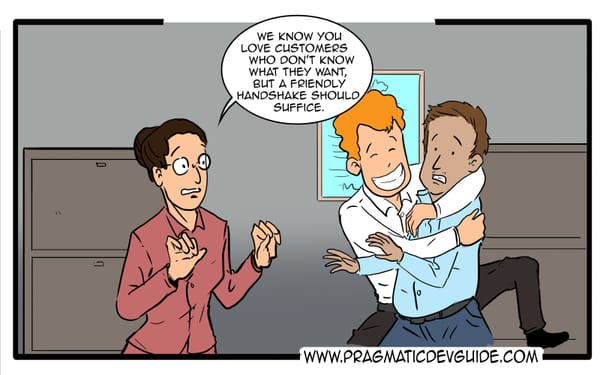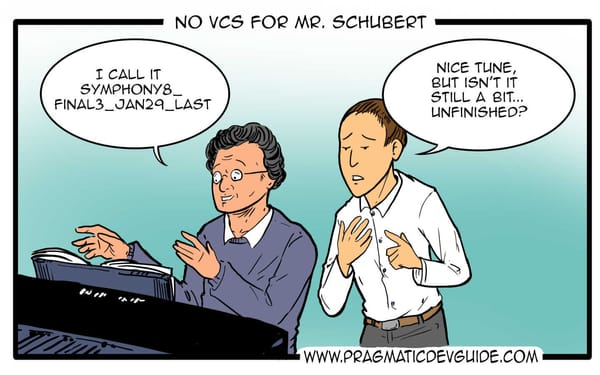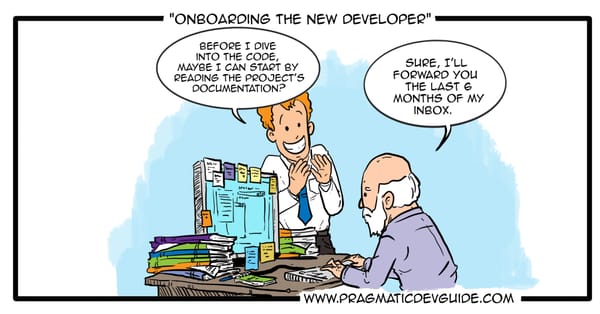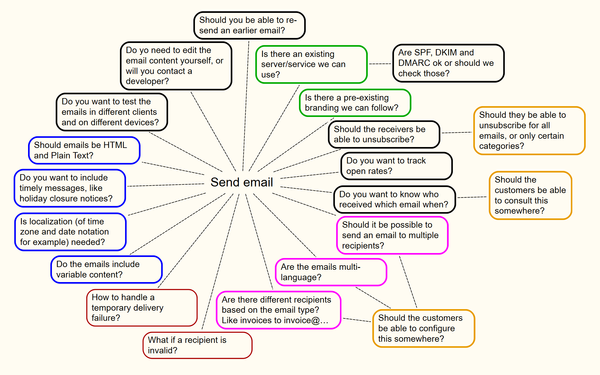Shhh! The Secret to Increased Developer Productivity?
In a world of open offices and constant pings, one of the secret weapons for increased developer productivity isn't a fancy new tool or a bigger team. It's something much simpler, and ironically, quieter.

"All those developers are prima donnas" the CEO said. I had just sent him an article from Joel Spolsky on boosting developer productivity. He thought it was BS.
A few years later, Spolsky's small but focused team created Trello. Atlassian bought it for $425 million. His next endeavour, Stack Overflow, was acquired for $1.8 billion.
These successes weren't just luck. They stemmed from understanding how developers work and how to increase their productivity.
Developers construct a mental model of the software they work on
This isn't only about remembering code. It's about holding an entire system's architecture, relationships and behaviors in mind simultaneously. Building and maintaining this model requires intense concentration and sustained, uninterrupted focus.
A noisy workspace isn't helpful, but the real concentration killers are interruptions.
A 'quick question' often disrupts productivity for far longer than it takes to answer it. When focus breaks, it derails the entire train of thought. Getting back 'in the flow' takes significant time and effort to rebuild the mental model.
And if you think this is BS, there's extensive research to back the impact of interruptions
One study found it takes about 23 minutes to regain full concentration after an interruption.The study also revealed that frequent interruptions significantly increase stress and frustration. Additionally, these disruptions lead to heightened mental effort and amplified feelings of time pressure.
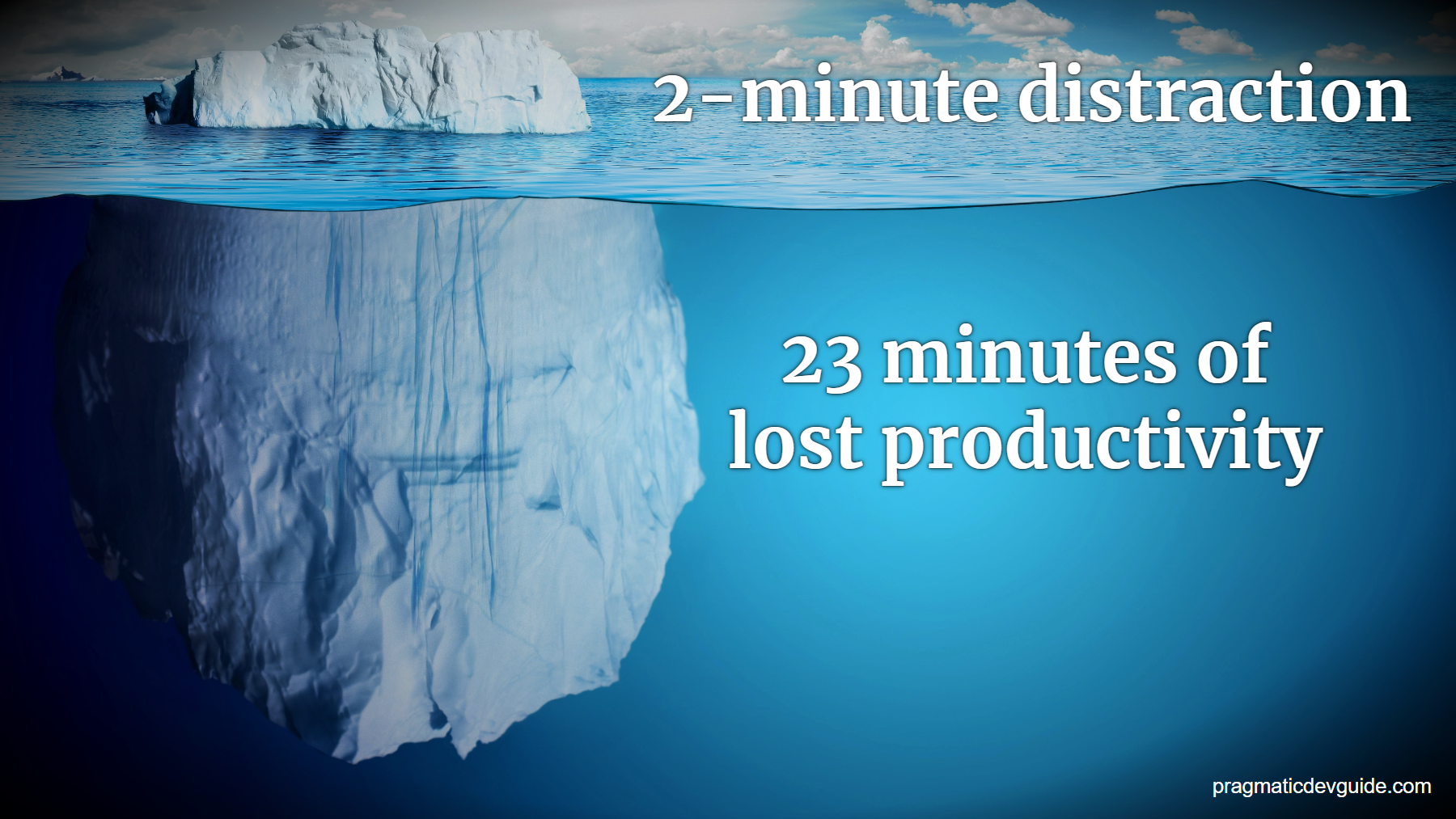
Even the tech giants agree
Microsoft and GitHub researchers developed the SPACE framework for measuring developer productivity. This framework captures the most important productivity 'dimensions':
- Satisfaction and well-being
- Performance
- Activity
- Communication and collaboration
- Efficiency and flow
The 'E' here specifically addresses the importance of uninterrupted work time to enter a state of peak productivity.
And who wouldn't want a team at peak productivity?Perhaps the secret isn't throwing more developers at a problem, but just leaving the current ones alone for 10 minutes? I've been in situations where 23 minutes of uninterrupted work would have been a blessing.
So, are you suggesting to put developers in solitary confinement then?Well, don't start googling for "developer-friendly prison cells" just yet. The real goal is finding a balance between collaboration time and distraction-free focus time.
While a completely distraction-free environment is unrealistic, designated blocks of focused time aren't
A workable option is to establish "Do Not Disturb" hours. For instance, agree that developers won't be interrupted between 9-11 am and 2-4 pm. During these times, developers should mute notifications on their devices. Except for urgent family messages of course.The goal is to carve out dedicated focus time in an otherwise collaborative workday.
But what about urgent questions from support, sales, or customers during this time?
First, define "urgent." Often, it's easier to ask a developer than to check documentation or colleagues. Also, try to let these questions wait. You might be surprised how many resolve themselves or can be answered elsewhere.And if your organization truly can't function without immediate developer access, consider that a risk.
Still need continuous access to the devs? Introduce the 'SPOC' (Single Point Of Contact)
Here's how it works:
- Designate one SPOC per team for truly unavoidable queries.
- Rotate the SPOC role regularly to prevent burnout and keep everyone engaged.
- Interaction with the SPOC should be via email or a dedicated chat channel. No physical interruptions, smoke signals or carrier pigeons.
- If necessary, the SPOC can respond to the question in person, or escalate to a team member.
This balances developer accessibility with protected focus time for the rest of the team.
Another option: embrace remote work for deep focus
If your organization is still resistant to remote work, I wish to welcome you to 2024:
- Offer flexible work-from-home options as 'deep work' days.
- Have clear objectives and progress assessments.
- Minimize non-essential communications.
Far from being just a pandemic-driven trend, remote work can be a game-changer for developer productivity.
Wrapping Up: Steps to increased focus and productivity
- Minimize interruptions and distractions.
- Implement 'Do Not Disturb Hours': designated time slots for focused work.
- If you haven't already, embrace remote work. Just ensure it's not trading office distractions for home distractions.
So before you start posting job ads, try to optimize the productivity of your existing team. Your thoughts or experiences? I'd love to hear them.
Making sure the developers have dedicated focus time is just the tip of the productivity iceberg.
Sign up and level up with each new article.
No costs, unsubscribe anytime.
Additional resources
(besides the ones already mentioned in the article)
The "Flow" concept by Mihaly Csikszentmihalyi. This psychological concept describes a state of full immersion in a task, which is highly relevant to developer productivity and the impact of interruptions.
The "Deep Work" philosophy by Cal Newport emphasizes the importance of concentrated, uninterrupted work for high-value output?
The "Maker's Schedule, Manager's Schedule" essay by Paul Graham discusses how developers (makers) and managers work on different schedules, which can lead to productivity conflicts.
The hidden cost of interrupting knowledge workers discusses the cost of interruptions and ideas on how to handle them.
Interruptions in Agile Software Development Teams. An extensive study on the types of interruptions identified in agile software development teams and how teams responded to them.
You know of more relevant resources? Let me know!

